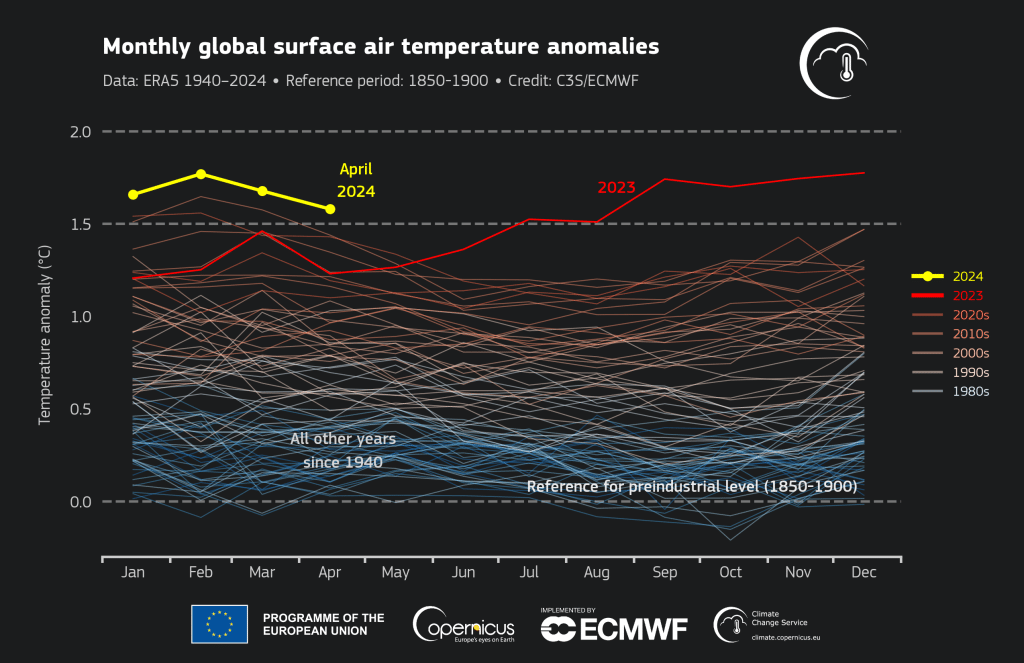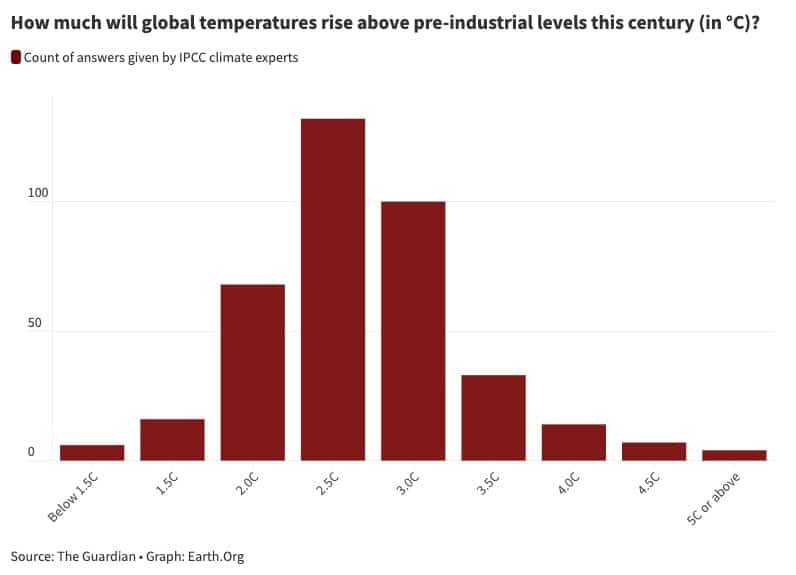This weekly round-up brings you key climate news from the past seven days, including deadly floods in East Africa and Brazil and yet another record-breaking month for global temperatures.
—
1. April Marks 11th Consecutive Month of Record-Breaking Temperatures As Scientists Warn of ‘Uncharted Territory’
April was the eleventh month in a row to set a new record after temperatures in March reached unprecedented levels, new data has shown. This has only happened another time before, during the last El Niño event in 2015-2016.
According to the latest climate bulletin published Tuesday by the Copernicus Climate Change Service (C3S), the average global temperature last month stood at 15.03C, 0.67C higher than the 1991-2020 average for April and breaking the previous record set in 2016.

Despite the gradual weakening of El Niño, a weather pattern associated with the unusual warming of surface waters in the eastern equatorial Pacific Ocean, the global sea surface temperature remained “unusually high” last month, Copernicus said, averaging at 21.04C – the highest value on record for April.
Read more here.
2. High Court Finds UK’s Net-Zero Strategy ‘Unlawful’ for Second Time in Less Than 2 Years
In last week’s ruling, Mr Justice Clive Sheldon said the decision of former energy security and net zero secretary to approve the Carbon Budget Delivery Plan (CBDP) in March 2023 “was taken on the basis of a mistaken understanding of the true factual position,” and was “simply not justified by the evidence.”
Under the country’s Climate Change Act, the Secretary of State is required to adopt plans and proposals that will enable upcoming, legally binding carbon budgets – a cap on the amount of greenhouse gases emitted in the UK over a five-year period – to be delivered.
Once again, the Secretary of State was given 12 months to draw up a revised plan, ensuring that the UK achieves its legally binding carbon budgets and its pledge to cut emissions by over 68% by 2030 relative to 1990 levels.
Read more here.
3. Brazil Floods: More than 100 Dead and 200,000 Displaced as Experts Link Disaster With Climate Change
The death toll from the devastating floods that have submerged entire cities and towns in southern Brazil has risen to 107 on Thursday, as authorities fear water levels will rise further as more torrential rain is forecast in the region over the weekend.
Nearly 1.5 million people have been affected by the deadly floods that wreaked havoc across 428 municipalities in the southern state of Rio Grande do Sul, displacing more than 165,000 as of Thursday evening. Local authorities said the floods were the worst natural calamity ever to hit the state, home to 11 million people.
While Brazil and neighbouring countries are no strangers to major rainfall, last week’s storms were significantly stronger and devastating, with experts attributing the heightened rainfall to a combination of global warming and the El Niño weather pattern, a phenomenon associated with the warming of waters in the eastern Pacific Ocean. According to the Brazilian Reporter, Rio Grande do Sul authorities issued a total of 953 emergency or calamity decrees since 2013, with around 28% of them issued last year alone.
Read more here.
4. Kenya, Tanzania Hit By First-Ever Cyclone Following Weeks of Heavy Rain, Deadly Floods
Cyclone Hidaya, which brought winds of up to 165 kph (102.5 mph) and waves almost eight meters high, prompted the Kenyan government to issue mandatory evacuation orders for residents near 178 dams and water reservoirs in 33 counties. No casualties or damage were reported, although most of Tanzania experienced a major blackout and thousands of people were displaced.
Hundreds of people have died in East Africa in recent weeks from floods and landslides triggered by heavier-than-usual torrential rains. The extreme weather, experts say, is linked to the El Niño weather pattern, a climate phenomenon related to the warming of sea surface temperatures in the central-east equatorial Pacific.

In Kenya, flash floods have claimed at least 228 lives and displaced 200,000 people since March, according to the toll from the Ministry of Interior and National Administration updated on Sunday. In neighboring Tanzania, flood-related deaths rose to at least 155 and over 200,000 refugees hosted in two refugee camps were affected.
Read more here.
5. ‘Impossible Not to Feel Hopeless’ – Guardian Survey of IPCC Scientists Reveals 1.5C Goal Out of Reach
An exclusive survey of nearly half of all lead authors and review editors of the Intergovernmental Panel on Climate Change (IPCC) reports since 2018 conducted by the Guardian revealed that the 1.5C goal is increasingly out of reach.
Of the 380 authors and editors interviewed, 132 (34.7%) expect global temperatures to rise by 2.5C this century, while 100 (26.3%) predict at least 3C of warming. In total, 358 respondents, more than 94%, think humanity will breach the 1.5C threshold.

So far, the world has warmed by 1.1C compared to pre-industrial times, though IPCC data suggests that 20-40% of the global human population live in regions that, by the decade 2006–2015, had already experienced warming of more than 1.5C in at least one season. According to the UN body, every 0.5C (0.9F) of global warming will cause discernible increases in the frequency and severity of heat extremes, heavy rainfall events, and regional droughts.
Read more here.


















